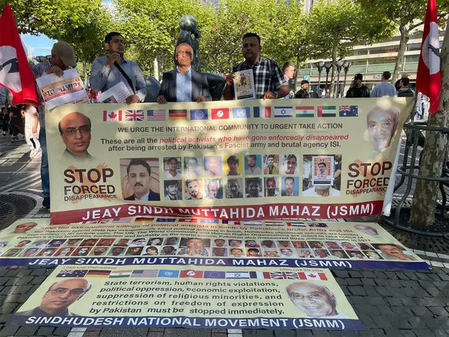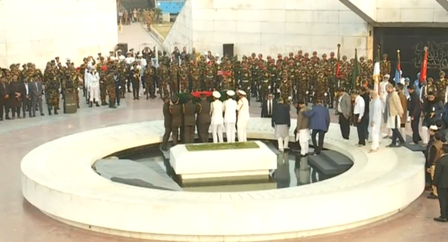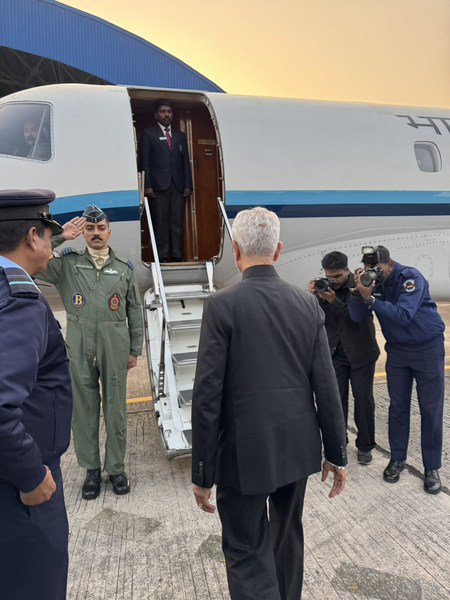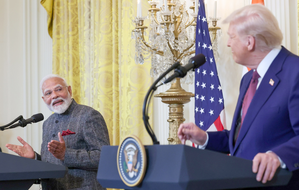
Frankfurt, Sep 23 (IANS) Jeay Sindh Muttahida Mahaz (JSMM) chairman Shafi Burfat has accused Pakistan of systematically enslaving, marginalising, and politically suppressing Sindhis, Pashtuns, Baloch, Saraikis, and Brahuis under the pretext of religious unity. He also urged the United Nations and international community to recognise that the state of Pakistan represents an ongoing threat to the rights, culture, and existence of its historical territories.
In an open letter addressed to the leaders attending the United Nations General Assembly’s 80th session, Burfat accused Pakistan of actively suppressing human rights, religious minorities, and indigenous people through systemic violence and state-backed terrorism. He demanded a ban on Pakistan from speaking in any credible international forum for its crime of supporting, training, and preparing extremist terrorists, and using these terrorists under state policy in the region. He called on the international community to question the reality of Pakistan.
“As Pakistan’s Prime Minister and other representatives prepare to attend the 80th session of the United Nations General Assembly, the world must question the reality of Pakistan, a state established by subjugating its historical nations through the deception and manipulation of religion. Over decades, Pakistan has systematically enslaved, marginalised, and politically suppressed its indigenous nations, Sindhis, Pashtuns, Baloch, Saraikis, and Brahuis, under the pretext of religious unity. These nations have suffered extreme political oppression, economic exploitation, cultural erasure, demographic manipulation, and in many cases, severe human rights violations,” he wrote in the letter.
“Pakistan functions as a state designed primarily to serve the interests of one dominant ethnic group: the Punjabis. The military, intelligence agencies, and diplomatic corps are overwhelmingly Punjabi, over 99% ensuring political and social dominance of this single group over all others. This concentration of power has turned Pakistan into a machinery of systemic oppression, where historical nations are subjected to extreme forms of modern-day slavery and political subjugation,” he added.
He mentioned that secular political parties, national movements, and civil society activists face state-imposed restrictions in Pakistan. He accused military and state agencies of Pakistan of routinely detaining political workers, social workers, and social media activists, tortured in secret facilities, and, in some cases, their tortured and charred bodies are disposed of in remote areas.
According to him, Pakistan serves as a paradise for the ruling Punjabi elite and terrorists while rest of its “historical nations” face systemic oppression, exploitation, and existential threat. He stated that religious extremism and terrorism receive persistent state patronage in Pakistan, further undermining human rights and democratic freedoms.
In the open letter, Shafi Burfat stated, “It is crucial for the international community and member states of the United Nations to recognise the following truths about Pakistan: Its leadership bears historical responsibility for the deaths of over three million Bengalis during the 1971 genocide. It continues to enslave and politically dominate historical nations through military coercion. It actively suppresses human rights, religious minorities, and indigenous populations through systemic violence and state-backed terrorism.
“Given these realities, it is both principled and necessary that no representative of Pakistan should be granted unquestioned legitimacy to speak or participate in serious global deliberations without scrutiny. Instead, they should be held accountable for their support of religious extremism, human rights violations, and political subjugation of indigenous nations. Legal action in international courts should be considered against those responsible for these ongoing atrocities,” he highlighted.
Present the political and principled stance of Sindhis before the United Nations and the international community, Burfat demanded that Pakistan’s representatives should acknowledge the inherent, natural right of historical nations to self-determination and recognise the question of the freedom of these nations and cease maligning national liberation movements and struggles for freedom by labelling them as foreign agents or terrorists.
“We urge the global community to take a principled political stance in support of the freedom of oppressed nations and affirm their right to achieve national independence. The global community must recognise that the so-called state of Pakistan represents an ongoing threat to the rights, culture, and existence of its historical nations. Attending international forums without accountability would only legitimise a system built on oppression, exploitation, and terror.”
He called upon the leaders of the UN General Assembly and member states to uphold international justice, human rights, and the principles of equality among nations by acknowledging these realities and supporting the legitimate struggle of oppressed nations for freedom and self-determination.
“Pakistan should be barred from speaking in any credible international forum for its crime of supporting, training, and preparing extremist terrorists, and using these terrorists under state policy in the region,” he added.
–IANS
akl/as




